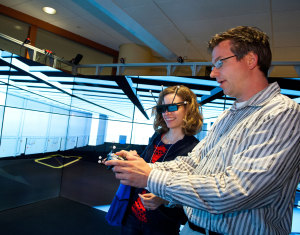 If you are a graduate psychology student seeking job options beyond the traditional career paths in clinical or counseling psychology, then you may be the perfect fit for becoming an aviation psychologist.
If you are a graduate psychology student seeking job options beyond the traditional career paths in clinical or counseling psychology, then you may be the perfect fit for becoming an aviation psychologist.
Within the field of human factors psychology in one of the least well-known sub-specialties, aviation psychologists put their talents to use in studying ways to improve the performance of pilots, flight attendants, and air traffic controllers. As technology continues to advance on a daily basis and threats of terrorism grow, aviation workers are experiencing increased stress, anxiety, and frustration on the job. In fact, commercial airline pilots have been recognized for having the 4th most stressful job in America!
Read on to learn about how aviation psychologists are helping flight crew members manage their emotions to optimize performance.
What Aviation Psychologists Do
Aviation psychologists are highly trained to meet with airborne personnel regularly to provide counseling services for addressing any problems, anxieties, or job-related stresses that they are dealing with. In the event of terror threats, air crashes, a crew member’s death, equipment failures, and other calamities, aviation psychologists will specifically play a prominent role in counseling all workers involved to properly confront their trauma. For research-oriented aviation psychologists, daily duties may involve designing flight decks, assessing plane safety features, investigating aviation crashes, and conducting studies related to airline safety. In general, aviation psychologists are responsible for ensuring the security and peace of mind for flight crew members who operate aircraft.
Where Aviation Psychologists Work
In recent years, the airline industry has begun to recognize that the control of human error is essential to improve their already excellent safety record. As a result, aviation psychologists have been growing in demand for employment at commercial airlines, aerospace companies, and government agencies. Aviation psychologists are often responsible for maintaining a safe environment for counseling airline professionals to manage stress, overcome trauma, or avoid job-related conflicts. Some aviation psychologists also find job opportunities in military settings to provide therapy sessions to pilots in the armed forces who need assistance in processing the mental burdens of their daily operations and quelling anxiety.
How to Become an Aviation Psychologist
While a bachelor’s degree in psychology is the bare minimum requirement for aviation psychologists, employers will typically prefer that these mental health professionals have a master’s degree to provide counseling services or a doctoral degree to conduct research. Since there are no degree programs specifically offered in aviation psychology in the United States, many aviation psychologists decide to pursue a degree in cognitive psychology, clinical psychology, counseling psychology, industrial psychology, or social psychology, depending on their future career goals. In particular, employers are looking for aviation psychologists who have knowledge of the aviation industry and possess strategies that will be useful in helping aviation workers. Many aviation psychologists enhance their professional development opportunities by becoming members of the Association for Aviation Psychology as well.
Since negative emotions can lead aviation workers to perform badly and place the lives of many passengers in harm’s way, aviation psychologists are becoming increasingly important for ensuring that airline personnel possess the mental acuity needed to maintain optimal functioning in flight. Therefore, becoming an aviation psychologist can lead to a fruitful career in assessing, counseling, supporting, and treating various flight crew members to deal with any issues that can arise from working in the airline industry.





